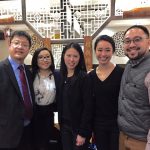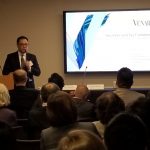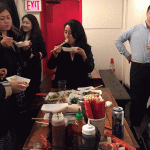The Careerist: Asian-American Women Are Filling the GC Suite
The Careerist: Asian-American Women Are Filling the GC Suite
Vivia Chen’s latest Careerist column talks about the uptick in Asian American women GCs in the US:
Of the 20 Asian-American lawyers now heading the legal departments of Fortune 500 companies, eight are women. And in China, where patriarchy rules and boys are still favored, over 50 percent of general counsel are women, reports legal consulting firm Acritas.
Past AABANY Presidents Jean Lee and Clara Ohr are quoted in the article.
To read more follow the link in the title (subscription required).
Bereavement Notice – Han C. Choi
With great sadness, AABANY announces the passing of Han C. Choi on March 26, 2018. Known by many around the country as a leader, mentor, trailblazer and friend, Han was active in NAPABA and was the Managing Partner of the Atlanta office of Ballard Spahr LLP.
AABANY, together with KALAGNY and CAPABA, held a fundraiser on March 22, the proceeds of which were donated to the Han C. Choi Scholarship Fund, administered by the NAPABA Law Foundation.
As announced on the Ballard Spahr website:
A memorial service for Mr. Choi will be held at 3 p.m. on Sunday, April 15, at First Presbyterian Church of Atlanta, 1328 Peachtree Street, Atlanta, Georgia. Han’s family has requested that memorial donations in his name be made to the NAPABA Law Foundation’s Han C. Choi Scholarship Fund, https://www.napabalawfoundation.org/foundation-scholarships, or the Decatur Education Foundation’s Han C. Choi Memorial Scholarship, https://decatureducationfoundation.org/han/.
For more about Han and his life’s work, see the “Remembering Han C. Choi” page on the Ballard Spahr website: http://www.ballardspahr.com/the_firm/inmemoriam-han-choi.aspx
Our thoughts and condolences go out to Han Choi’s family.
Welcome to the FY 2018 AABANY Board of Directors
AABANY’s 2018 Fiscal Year began on April 1. We are pleased to welcome this year’s Board Officers and Directors.
Officers
James Cho, President
Brian Song, President-Elect
Dwight S. Yoo, Immediate Past President
Jeff Ikejiri, Vice President of Programs and Operations
Charles Chen, Vice President of Programs and Operations
Edward Kim, Treasurer
Margaret Ling, Development Director
Francis Chin, Technology Director
David Sohn, Membership Director
Dai Wai Chin Feman, Secretary
Directors
Jung Choi
Marianne Chow
Diane Gujarati
Suzanne Kim**
Chris Kwok**
Naf Kwun
Bobby Liu*
Sonia Low*
Sapna Palla
Terrence Shen*
Manisha M. Sheth*
Irene Tan*
Larry Wee*
Andy Yoo**
Executive Director
Yang Chen
Officers serve one-year terms and Directors serve staggered two-year terms, except as noted below. Single asterisk next to a Director’s name indicates that he or she is in their second year. Double asterisks next to a Director’s name indicates that he or she is serving only a one-year term.
Please join us in welcoming and congratulating the new and returning Board Officers and Directors as they embark on another year of leading AABANY as an active and vibrant bar association promoting the interests of APA lawyers and the community they serve.
This year’s theme, announced at the 2018 Annual Dinner, is “Serving Our Community, Advancing Our Profession.” We hope all our members and anyone interested in promoting our mission will help our new Board in fulfilling that theme.





























